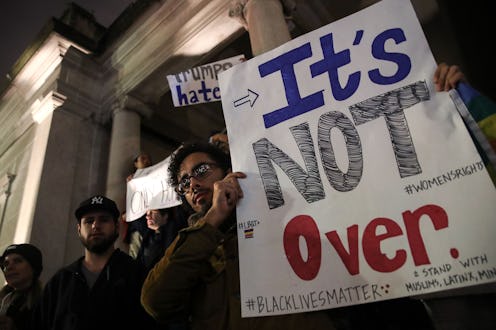Life
What Do Trump Protesters Want?
On Wednesday, thousands of people took to the streets of major cities across America to protest the election of Donald Trump to the U.S. presidency. Though the protests were largely peaceful, there was a palpable sense of rage as people denounced the new president-elect. What do Trump protesters want? Many protesters simply want to do what it says on the tin: Protest, and make clear that Donald Trump does not stand for them or their beliefs. Some, however, believe that there may still be a chance to keep Trump out of the White House.
Protests in major cities, including Atlanta, Austin, Boston, Chicago, Denver, Philadelphia, Portland, Oregon, San Francisco, Seattle, and Washington, featured thousands of people carrying signs and yelling their criticism of the president-elect. According to CNN, protesters in Portland chanted, “No Trump, no KKK, no fascist USA,” while those in Los Angeles burned a giant piñata of Trump’s head. Students at American University burned an American flag, and college and high school students around the country walked out of class in protest.
It appears that most of the protesters took to the streets to express their anger and their refusal to allow a racist, misogynist, xenophobic man to speak for them. Many were there to give a face and a voice to the numerous marginalized communities that are threatened by Trump’s proposed policies.
However, some people still hold out hope that Trump can be prevented from taking office. They’ve honed in on two possible (though unlikely) routes to keep Trump out of the White House: Impeachment and influencing the Electoral College. Some protesters on the streets Wednesday carried signs with the words “Impeach Trump” on them, but they aren’t the only ones who want Congress to oust Trump; Google searches for “How to impeach a president” skyrocketed by 5,000 percent in the hours following Hillary Clinton’s concession speech, according to the IB Times. People discussing impeachment are focusing on the number of lawsuits with which Trump is currently involved, especially the accusations of fraud and racketeering surrounding Trump University. (Trump will, in fact, be headed to court at the end of the month regarding a class action lawsuit against Trump University).
In an article published before the election, University of Utah law professor Christopher Lewis Peterson discussed the possibility of impeaching Trump if he were to be found guilty of fraud and racketeering in relation to Trump University; he wrote,
Despite historical debate, as a matter of law it is clear that Congress would be well within its prerogatives to impeach and remove a president for grave felonies — crimes which are punishable by years in prison — such as fraud or racketeering.
However, even if it’s possible for Congress to impeach Trump on these grounds, it doesn’t seem very likely that it would do so, especially not now that both houses and the office of the president are all under Republican control.
The other option some protesters are exploring is that of attempting to influence the Electoral College to vote against Trump. The Electoral College is made up of electors that have been selected, in most cases, by political parties in their states. When Trump won Electoral College votes for a given state on Tuesday, what that really meant was that voters had voted for the Republican electors in their state. The real vote for the president doesn’t happen until December 19, when electors cast their votes. Although the established precedent is that electors will vote for the candidate they’ve pledged to vote for, they don’t have to do so. Technically, they can cast their votes for whomever they’d like. Two dozen states have laws in place to prevent “faithless voting” (aka an elector voting against the popular vote in his or her state), but the penalties are mostly fines.
What does that mean for people trying to keep Trump from taking office? Some have argued that it’s possible to keep Trump from the presidency if people can get the electors to vote for Hillary Clinton, regardless of how their states voted. There is even a Change.org petition to make this happen, which, as of this moment, has more than 215,000 signatures.
Personally, I find these outcomes improbable. Like it or not, Donald Trump has been elected as the President of the United States, and, for better or worse (I’m hoping for better and bracing for worse), he will fill that role. I think the thing for people who oppose Trump to do now is to look forward to consider how the nation can weather his presidency. Donate to organizations that support those who will be marginalized by Trump’s policies. Volunteer. Get involved. And, perhaps more than anything, stay active in the voting process, at the local, state, and national levels.
